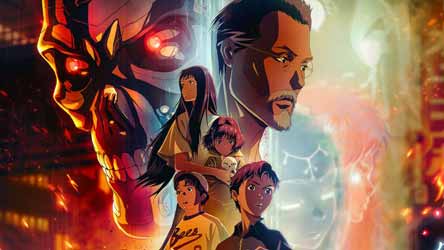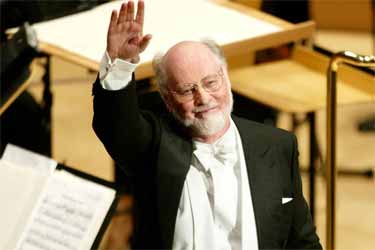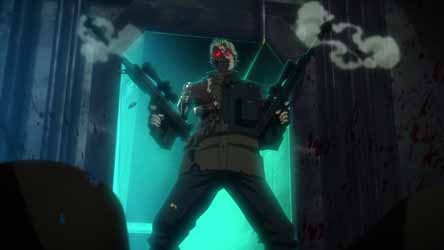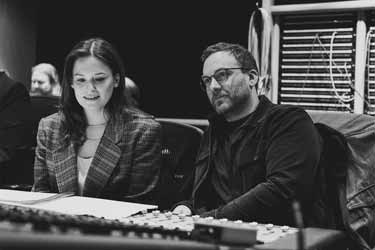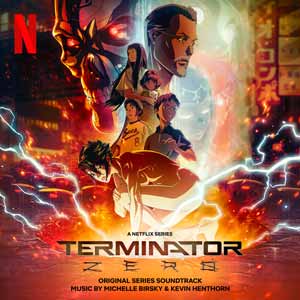|
Click here to return to the main site. Michelle Birsky & Kevin Henthorn (composers)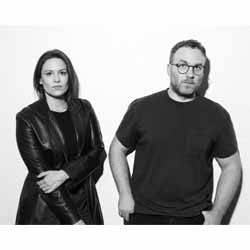 Michelle Birsky and Kevin Henthorn are a married, composing duo based in Los Angeles. Their music is contemporary and emotional, often incorporating found sounds and vocals with a strong electro-acoustic pull. With years spent in the New York indie music scene, Birsky and Henthorn bring a unique perspective to composition, drawing inspiration from composers like Trent Reznor & Atticus Ross, Jóhann Jóhannsson, and Mica Levi. Birsky, a vocalist, producer, and electronic musician, and Henthorn, an accomplished guitarist and vocalist, bridge their talents into a cohesive, well-rounded entity that creates emotionally-driven, electro-acoustic music. Their latest project is Terminator Zero, the new Netflix anime series. Darren Rea caught up with Birsky and Henthorn as Lakeshore Records released the score for Terminator Zero... Darren Rea: How did you originally get involved with Terminator Zero?
Michelle Birsky & Kevin Henthorn: We were working on the film Mother/Android with Mattson Tomlin and he mentioned that he was working on a Terminator anime. Unbeknownst to him, we decided to write an album’s worth of material, inspired by what we thought Mattson + Terminator + anime would sound like. Luckily, the music struck a chord with Mattson and he started writing the script while listening to the music. Many of those demos stuck and became the main themes for the show and were our guide posts as we got into the series. With expectations of what a “Terminator” score should “feel like” was it challenging to deliver something new whilst also feeling like it belonged to the franchise? It was definitely a challenge, however there is freedom in creating something new. While we drew inspiration from the original Terminator film, we knew we wanted this score to have its own sonic identity, while still belonging to the Terminator world. We did this by emulating a few sonic elements, like the use of metallic hits and arpeggiated synthesizers, but we introduced a more modern take by staying away from traditional strings and '80s synth sounds, and leaning more into modern technology to cut up and distort acoustic samples. We took a very character-based approach in writing themes for this series that pushed us to stay in a more internal, melancholic space. We leaned into the melancholy and existential dread in a way that past Terminator iterations haven’t. Who are your musical heroes?
Johnny Greenwood, Trent Reznor and Atticus Ross, Jon Brion, John Cage, St. Vincent, Joni Mitchell. Can you remember the first piece of music you heard in a film/TV show that made you sit up and take notice of the importance of music? Michelle: The earliest time I can remember really sitting up and taking notice of film music was John Williams’ Flying Theme from E.T. I remember as a little kid being very aware that the music was making me feel something. Much later, I had the same experience watching The Social Network and hearing Trent Reznor & Atticus Ross’ score. When the opening cue 'Hand Covers Bruise' played, I was stunned. It has this “ah ha” moment, realizing that film composing could be experimental and electronic, while still punching you in the gut emotionally. That’s the score that made me want to become a film composer. Kevin: For me, it’s another John Williams score. As a kid seeing Close Encounters of the Third Kind blew my mind. I was obsessed with the way the music integrated with the plot and it’s definitely the first time I remember really noticing film music in an impactful way. Which track or theme are you most proud of in Terminator Zero, and why?
'Police Station' is one that we’re most proud of, mostly because it was a massive, difficult cue that ebbs and flows. In the scene, which takes place in episode 4, the Terminator is walking through a police station looking for the kids. Lots of fighting takes place, with some skulking, culminating in an epic battle between Misaki and the Terminator, in which (without giving too much away) we find out some pretty major news about Misaki. We had to follow the scene with the score, ebbing and flowing with the action, and finally ending in Misaki’s theme, fully realized with choir. It took a lot of time and effort, but we’re really happy with how it turned out. What are the advantages and issues you come across living and working together. Is it easy to separate working and family life? One thing that’s great about living and working together is that we work from a home studio, and can easily pass the work back and forth, taking breaks when we need to. It’s awesome being able to bounce ideas off of each other and edit each others’ work until it reaches its final form. The disadvantage, we work from home, so we’re not exactly leaving work at work. It’s easy for work and life to blend into each other, so we try to stay aware of when we’re getting too “sucked in” and make time to go out and experience the world. Which part of the process do you enjoy, and which do you dread, the most?
The beginning of a project is always really fun. We love coming up with melody ideas and character themes, and mapping out the whole project like a puzzle. It’s a time of total creativity and inspiration. The parts that we dread the most are probably the more administrative, non-creative aspects, like file management and bouncing stems. Is there ever enough time and money when it comes to your job? Usually, there’s not enough time, however Terminator Zero was a very different story. We had about one month per episode, so it was pretty amazing to be able to have that space and time to really dig into the music. Financially, we think studios should (and could) value music more than they currently do. Most networks give composers “all in deals”, meaning the composer is responsible for all recording costs. This is rarely enough to cover a composer’s salary and live musicians. Do you think that AI will ever permeate the world of composing? That composers will one day be replaced by machine?
We hope not, but it’s definitely a fear. We don’t think that all composers will be replaced by machines, because as a species we still value art, and the people who make it (otherwise nobody would watch the Oscars). That said, we can definitely see a world in which studios start using AI music to cut costs, which would really be a shame. If a movie were to be made about your life who would you like to compose the soundtrack? Michelle: Trent Reznor and Atticus Ross Kevin: Jon Brion
The original score for Terminator Zero is available digitally from Lakeshore Records Click here to buy the album digitally (UK) - Amazon.co.uk This interview was conducted on 13 September 2024 Return to... |
|---|
